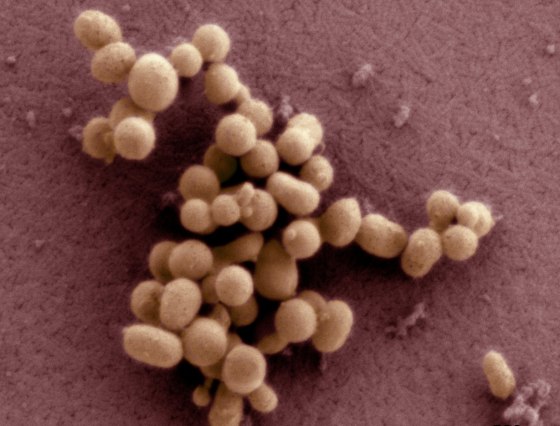The pioneer who produced the first organism programmed with synthetic DNA admits that the creature's genetically coded message really needs to be corrected.
Last year, geneticist J. Craig Venter and his colleagues announced that they basically hijacked the genetic machinery of a strain of bacteria known as Mycoplasma capricolum, by implanting the synthetically produced DNA patterned after a different strain, M. mycoides. The researchers added a few coded "watermarks" to the DNA, to prove that the resulting organism really did reflect the synthetic genome.
The watermarks consist of triplets of DNA pairs, with each triplet representing a character of text. For example, a string of guanine, thymine and cytosine, or GTC, stands for the letter "T." The DNA string was built up to spell the names of Venter and his collaborators, as well as a snippet of HTML Web coding and three well-known quotations.
- "To live, to err, to fall, to triumph, to recreate life out of life." — James Joyce (in "A Portrait of the Artist as a Young Man")
- "See things not as they are, but as they might be." — Manhattan Project physicist J. Robert Oppenheimer (as quoted in "American Prometheus")
- "What I cannot build, I cannot understand," — Quantum physicist Richard Feynman
The only problem is, that Feynman quote is wrong. The classic Feynman quote, as written on a blackboard at Caltech just before he died, goes like this: "What I cannot create, I do not understand."
Plenty of Feynman fans pointed out the misquote soon after the Mycoplasma research was announced last May, but the error seemed destined to go down as one of history's enduring quotroversies, alongside Neil Armstrong's long-debated "One Small Step" declaration from the lunar surface. Until now.
As David Ewalt reported on Forbes' Metagamer blog, Venter fessed up to the error during this month's South by Southwest conference in Austin, Texas. The geneticist said that Caltech sent him a note about the misquote, and even included a picture of the blackboard displaying the correct version.
"We agreed what was on the Internet was wrong," Ewalt quoted Venter as saying. "So we're going back to change the genetic code to correct it."
Does that mean the Venter team's synthetic bacterium will be re-engineered? Heather Kowalski, a spokeswoman for the J. Craig Venter Institute (and Venter's wife), couldn't immediately confirm that part of the story. But she did clarify another angle, having to do with that James Joyce quote.
Joyce's estate is notoriously vigilant in its efforts to guard against unauthorized use of the Irish author's prose — and in his report from SXSW, Ewalt quoted Venter as saying that the research team received a "cease and desist" letter from the estate, complaining that the "Life Out of Life" sentence had been used without permission.
In her email, Kowalski told me that the reports about the letter had "gotten a little out of whack," and that there was no legal action in the works.
"The Joyce Estate legal team sent a letter expressing 'disappointment' that JCVI/Craig did not seek permissions from the Estate to use the quote that was encoded into the first synthetic cell," she wrote. "Our lawyers believed and continue to believe that there was indeed fair use of the quote, and there has not been any further correspondence on either part since that initial letter from the Estate."
If Venter really does tweak the synthetic DNA to fix the Feynman quote, I'd love to see him add yet another quotation to reflect on these latest twists. Here's my suggestion, from "Ulysses," James Joyce's masterwork: "A man of genius makes no mistakes. His errors are volitional and are the portals of discovery."
What quote would you enshrine in a bacterium? Feel free to add your favorites in the comment space below.
Update for 3 a.m. ET March 29: Here's what Kowalski had to say about the Feynman quote in a follow-up email: "Craig says it will be corrected in the synthetic cell."
More about synthetic genomics:
- First synthetic life form holds promise, peril
- Venter Q&A: Decoding the DNA decoder
- Synthetic life forms could make Mars trips easier
- Scientists work to create life from scratch
Join the Cosmic Log community by clicking the "like" button on our Facebook page or by following msnbc.com science editor Alan Boyle as b0yle on Twitter. To learn more about Alan Boyle's book on Pluto and the search for planets, check out the website for "The Case for Pluto."
